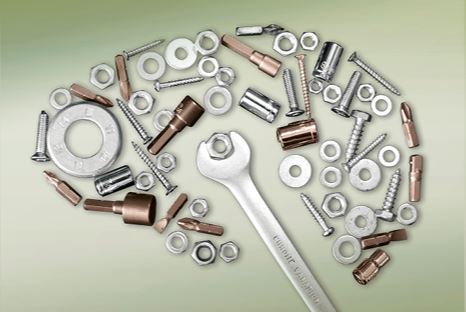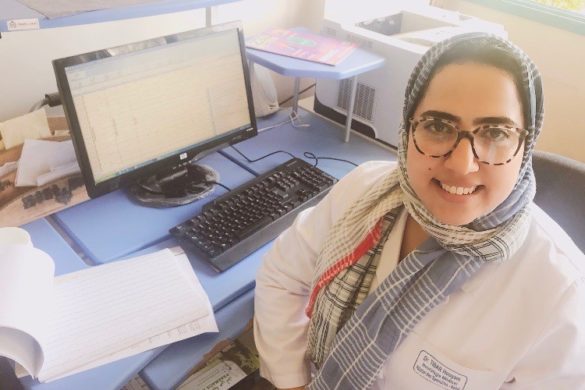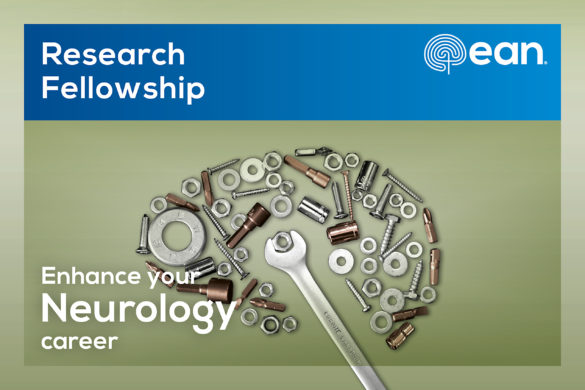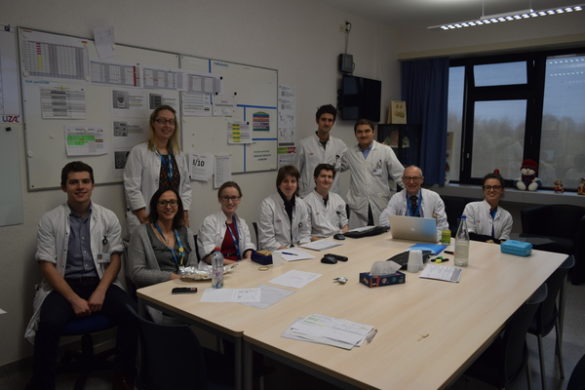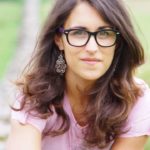
Report from Dr Sandra Manuela Dias Moreira from Amarante, Portugal visiting Institute of Genetic Medicine, International Centre for Life, Newcastle upon Tyne, UK under the supervision of Dr. Teresinha Evangelista.
My visit to the Institute of Genetic Medicine aimed at improving my clinical skills and scientific knowledge in the field of neuromuscular diseases. In order to accomplish my goals, I have mainly worked with the muscle team of John Walton Muscular Dystrophy Reasearch Centre, while attending some clinics held by clinicians outside the team.
During my internship, I was allowed to perform a quite wide variety of activities, including: attending in different clinics; participating in clinical, neuropathology and laboratory meetings; making clinical reasearch and some basic research; having contact with clinical trials, patient registries and networking projects.
During the first two months, I spent most of my time attending in clinics, which were run as: adult clinic, children clinic, new patients clinic, congenital myasthenic syndromes (CMS) clinic and Myotonic Dystrophy (MD) clinic. Clinics are held not only in Newcastle but also in some other places throughout the North of England, where I could observe dozens of patients with different muscular dystrophies and participate in clinical discussions concerning differencial diagnosis and genetic tests. As previously mentioned, I could also attend in other clinics outside the muscle team and observe patients with a variety of acquired neuromuscular diseases and neurogenetic sysdromes.
Besides neuropathology meetings, I also had the opportunity to learn from the muscular dystrophies teaching set and some additional selected muscular biopsies from patients with hereditary and acquired muscular diseases.
I was also able to get to know more about all the clinical trials that were run at the time and observe a patient included in one of them. Patient registries were introduced to me as large sets of patients‘ data from the UK or many centres in different countries throughout Europe, that serve as big databases that allow natural history studies of rare diseases.
Apart from clinical work, I was allowed to make some laboratory work, helping with polymerase chain reactions and gel electrophoresis.
During my last month in Newcastle I dedicated my time mostly to clinical research in the field of facioscapulohumeral muscular dystrophy (FSHD). In this sense, I was responsible for data collection, statistical analysis and results interpretation concerning the respiratory function in patients with FSHD.
My unique experience in Newcastle allowed me to develop clinical skills in the field of quite rare diseases, some of which I had never contacted before. The multidisciplinary approach and the expertise of clinicians and researchers were fundamental for an effective learning and knowledge achievement, which currently permit me to deal with my patients with much more self-assurance and clairvoyance.
The practice of translational medicine at the Institute of Genetic Medicine made it possible for a close involvement with research projects and consequently permitted an understanding of its importance in the field of neurosciences and, more specifically of neuromuscular diseases.
Despite the short time of my visit, I think it was a very profitable experience, not only for my professional career but also for my personal evolution as a clinician and human being.
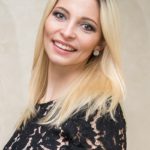
Report from Dr Sviatlana Harshova from Mogilev, Belarus visiting St. George’s Hospital, University of London, Atkinson Morley Dept. of Neurology, London, UK under the supervision of Dr. Anthony Pereira.
I spent my clinical fellowship under supervising Dr Anthony Pereira in St. George’s Hospital, Department of Neurology, London, United Kingdom, in the period from 05.09.2016 till 14.10.2016.
First of all, I would like to express my gratitude to EAN for excellent opportunity to expand my knowledge in neurology and see the healthcare system of highly developed country. I’m very grateful to Dr Anthony Pereira and Prof Hannah Cock for their direct participation in the organization of my training plan during clinical fellowship.
My daily routine was participation in team brief, revision of brain scans and ward round in William Drummond Ward (acute stroke unit) or in Kent Ward (general neurology) early in the morning, and then attending neuro outpatient clinics of any from disorders: Movement Disorders, Epilepsy, Headache, General Neurology, Dementia, Multiple Sclerosis or Pain Clinic. I had opportunity to participate in thrombolysis calls with junior doctors or help them with lumbar punctures, testing patients for deep brain stimulation treatment in day unit of neuroscience.
I was able to see the diagnostic process of stroke, its acute treatment and further therapy for patients after stroke with Dr Anthony Pereira. I expanded my knowledge in treatment for different types of epileptic seizures and management of epilepsy in particular groups of patients such as pregnant women and elderly with Prof Hannah Cock and knew more various approaches in management of Movement Disorders with Dr Dominic Paviour. In General Neurology Clinic I had a chance to see many chronic diseases of central and peripheral nervous system and learn more how they should be managed and followed up. Thankful to Ms Anne-Marie Logan (Headache Practitioner) I could learn more about last guidelines, classifications and measures for diagnosis and management of migraine. During my fellowship I knew a lot about possible social support and web resources, neurological societies (Alzheimer, Multiple Sclerosis, Parkinson, Epilepsy, Headache and etc.), that can be educational and helpful as for doctors, as for patients, their families and carers. I got more information and knew some special aspects of researches and trials in different areas of neurology. I learned more about complications of neurological disorders, side effects of medicines and lifestyle that I should recommend my future patients. The consultants were very kind and patient to share their experience and explain me all of doubts and difficult cases.
I was allowed to attend weekly instructive conversations of consultants with junior doctors on how to build a dialogue with patients and their relatives, analysis of difficult and interesting clinical cases. Also I attended teaching lectures in The John Parker Lecture Theatre and Neuroradiology meetings, where controversial MRI and CT images were thoroughly studied. Moreover I was lucky to attend Pan-London Calman Teaching Programme: Motor Neuron Disease, Early Diagnosis of MND and Kennedy Disease in UCL Institute of Education in London. Also I had an access to a St.George’s Library, where I could find useful information and necessary books.
EAN Clinical Fellowship (former D-D programme) in St. George’s Hospital helped me to expand my knowledge, improve my skills and adopt international experience in neurology. It is very important to me to continue my education and learn more aspects and new approaches for treatment neurological diseases, that I could introduce in my work practice.
As about financial part, London is one of the most expensive cities. There are very expensive public transport and accommodation. And provided grant covered only a half of my expenses. But in any case it was great support for me and I enjoyed this trip very much!
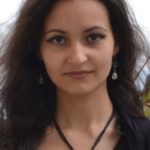
Report from Dr Stefania-Roxana Diaconu from Brasov, Romania visiting the Sleep Wake Epilepsy Centre, University Clinic of Neurology, Inselspital, Bern, Switzerland under the supervision of Prof. Johannes Mathis.
I would firstly like to thank EAN for offering me the opportunity to visit the Sleep-Wake Epilepsy Centrum of Inselspital in Bern, Switzerland. I am grateful to Professor Claudio Bassetti, Chair of Neurology Department, for accepting me is his department and to Professor Johannes Mathis, my supervisor during my training.
I spent in Inselspital 6 weeks together with a prestigious team of doctors and I had the chance to take part each day to all the activities related to clinical evaluation and management of sleep disorders. I am very grateful that I had the chance of an excellent practice with very friendly and professional staff, in an always very collaborative and welcoming ambient. I started by learning basic skills regarding the techniques of several investigations, like electrodes montages for polysomnography and MSLT/MWT, monitoring of the patients during the investigations, recognizing and dealing with common technical situations that might occur (for instance, cable or electrodes malfunctioning).
I assisted and followed the protocol to investigate the patients during the night (by polysomnography) and during the day (by several alternating investigations – MSLT/MWT, driving test and pupillography). In addition, I was supervised to learn the American Sleep Association rules for scoring and I assisted when medical doctors were scoring. I also scored some investigations by myself. Almost every patient had an actigraphy examination for one or two weeks before hospital admission and I learned how to interpret the results (also in relation with the sleep diary completed by the patient). Every investigation was further supervised by the chief doctor/Professor Mathis and I participated every day at various instructive discussions related to clinical interpretation of a scored investigation, distinctive polysomnographic aspects of various sleep disorders and also many useful information regarding classification, positive/differential diagnostic and therapeutic options of sleep disorders. As one of my particular interest in this field is related to movement disorders, I had the chance to observe many practical clinical and polysomnographic aspects of both movement and sleep disorders. Every Wednesday I joined the Sleep Report, where special cases were discussed with pulmonologists.
In addition to the activities I mentioned before, I also had the opportunity to join several private consultations and learn how to conduct a clinical interview, to evaluate a patient with sleep disorders using specific scales and also to manage practical problems that patients might experience after a trial with CPAP/APAP therapy.
Other than activities related to sleep disorders, I also visited the EEG laboratory where I learned the EEG montages and some EEG interpretations. Every Monday I attended the instructive presentations that were held at General Report and that covered various neurological themes (movement disorders, stroke, sleep disorders etc.). I attended to one of the BENESCO (Bern Network Epilepsy Sleep Consciousness) seminary and to the Neuro-Cardiology Symposium that was very informative and educative for me.
In conclusion, I am very grateful for the EAN experience fellowship grant that offered me the possibility to improve my knowledge regarding sleep disorders. I would like to further apply the information that I have gained back to my work place.
I would like to express my thanks once again to EAN, to Professor Claudio Bassetti and to Professor Johannes Mathis, for this wonderful and fruitful experience.
Report from Dr Andrea Kelemen from Budapest, Hungary visiting Hannover Medical School, Department of Movement Disorders, Hannover, Germany under the supervision of Prof. Dirk Dressler.
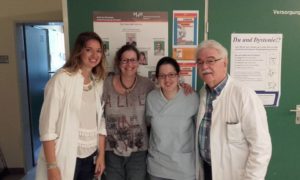 Summerizing the activities and utilities of my „Clinical Fellowsip“ in Hannover:
Summerizing the activities and utilities of my „Clinical Fellowsip“ in Hannover:
Usually, I spent my workdays at the Movement Disorders Policlinic. Here I had the opportunity to learn from the neurologists and fellows. During the botulinum-toxin consultant hours, I have seen many patients treated with botulinum toxin injections (patients living with dystonia, spasticity, migrain, axillar hyperhydrosis), I learned the principals of ColCapt concept (how to use botulinum toxin by patients with cervical dystonia). I also attended the general movement disorder consultant hours, that ment examining the patients and consulting about their treatment in case of patients with for example Parkinsons disease and Parkinson syndrom, Huntington chorea.
Other days, and afternoons I have took part in the work of the Station 43. It’s also a general neurological station but with a special profile of movement disorders, especially treatment in later stages of the disease, like LCIG and deep brain stimulation. I could learn special methods and points in programming DBS-Patients. I found the work group (Dr Cristoph Schrader, leader of the station and the trainees) fantastic, because the differential diagnostic approuches and thinking together were a special intellectual experiences for me.
I was a participiant of IIIrd Congress of Treatment in Dystonia, which was organised by my host Institute (I financed the registration fee of my own resources). The congress was very useful, becasue I am very interested in dystonia. Mainly I could develop my knowledge thees fields: botulinum toxin therapy, paroxismal dystonias, task specific dystonias, deep brain stimulation in dystonic patients, management of dystonic storm, physicotherapy in dystonia.
My host institute invited me the internal courses of the neurological department. Among other things, I could hear about spasmodic dysphonia diagnostic and treatment, regulating blood pressure in acut stroke, telemedicine in thrombolitic therapy in acute stroke.
I could also participate at a deep brain stimulation operation (and also the target planning and frame fixing) in case of a patient with Tourette-syndrome.
I spent a day at the stroke department, where we could compare the experiences and guidelines with the young german collegues. An other day, I was at the Emergency Department, and maked the consils together with the german trainee collegue.
To sum up, I enjoyed the time in Hannover very much. I really feel, that I could learn new things and develop my vocational competences. It was also a very good experience, to meet the (very professional and hardworking) german collegues. Last week, Professor Dressler asked me to make a small presentation about my home country and our home department, that was moving and kind from him and the collegues, they took time to participate at this small farewell event.
I got many-many help from Heike Gorzolla, who is the secretery of Prof Dressler, and helped to organise my accomodation, and I could always find her, if I had any problem or question.
I can recommend the Movement Disorders Department and Outpatient Center of the Hannover Medical School for other recipients of the EAN grant.
I would thank the opportunity for the journey to the European Academy of Neurology, and the kind help in administration and organisation to Magda Dohnalova as well.
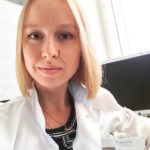 Report from Dr Julia Korzhova from Moscow, Russia visiting Dept. of Neurology, Insetspital, Bern University Hospital, Bern, Switzerland under the supervision of Prof. Johannes Mathis and Prof. Claudio Bassetti.
Report from Dr Julia Korzhova from Moscow, Russia visiting Dept. of Neurology, Insetspital, Bern University Hospital, Bern, Switzerland under the supervision of Prof. Johannes Mathis and Prof. Claudio Bassetti.
First of all I would like to thank EAN for giving me such the great opportunity to visit the Inselspital clinic in Bern, Switzerland and gain my knowledge and experience in enmg and neurology.
As a participant of Department-to-Department programme I spent time from 15.08.2016 until 09.09.2016 at the Department of Neurology in the University Hospital of Bern.
I’m a neurologist at Research Center of Neurology (Moscow, Russia). I have great interest in multiple sclerosis (MS) and other demyelinating pathologies of the neurological system. And also I am interested in neurophysiology. I’m working as a researcher in Department of Demyelinating disorders and start research work in neurophysiology department in Research Center of Neurology. So that is why this possibility to be in the University Hospital of Bern had special importance for me. I’m very grateful to this programme for the chance to gain new experience.
I have been taking active part in the everyday work of the center. I have participated in various meetings and discussions about the different kind of patients. My day started from morning meeting at 07.45. Then under the supervision of doctors we started daily activities.
I participated in different enmg studies. I had the opportunity to observe neurographies of peripheral nerves, I also took part in discussion of seen results. I saw a lot of patients with different kind of polyneuropathies’, motor neuron disease, myopathies, dystonia, myotonia neuropathies’, tunnel syndroms, plexopathies and other conditions.
I learned technics and principles of surface enmg and needle emg. Also i observed ultrasonography of peripheral nerves, all kinds of evoked potentials.
With prof. Kai Rosler we visited intensive care department to make examinations with those patients.
Several days I spent in Neurology department. The main daily activities were attendance of the morning meeting of the department of neurology and clinical rounds on the patients in the unit. With doctors and residents I could discuss patients and they often answered to my questions.
I also spent several days in neurorehabilitation department. I learned basic principles of ergotherapy and physiotherapy, participated in professors rounds and theirs daily activities.
I visited outpatient departments, Neuroimmunology and multiple sclerosis group. It was very interesting to discuss their opinion about prescription drug modified therapy in patients with multiple sclerosis. I could see patients under Rituximab, Tecfidera and I haven’t big experience in usage these kinds of drugs before.
During my stay in Inselspital I participated in theirs activities, in morning conferences, lectures and different meetings.
Of course there where some problems. Especially with language. Because they speak German and I not good in it. But it was not very difficult to understand and all doctors and residents always helped me with translation.
At the end of my letter I would like to thank the whole EAN team for giving me such a great chance to see neurology in Europe and make friends and relationships with my colleagues in Switzerland. I’m sure my Switzerland experience will be useful in my everyday work in terms of updating my skills and knowledge and also in terms of when there is need to be able to exchange opinions with my European colleagues.
With Kind Regards,
Julia Korzhova
Report from Dr Dominika Sisak from Budapest, Hungary visiting St. George’s Hospital, University of London, Atkinson Morley Dept. of Neurology, London, UK under the supervision of Dr. Anthony Pereira
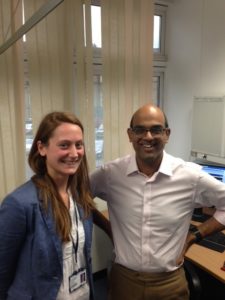 In the frame of the EAN D-D Fellowship Program I visited the St Geroge’s Hospital NHS in London. My main aim was to see the UK health care system and the ongoing clinical research programs.
In the frame of the EAN D-D Fellowship Program I visited the St Geroge’s Hospital NHS in London. My main aim was to see the UK health care system and the ongoing clinical research programs.
I started my work on the hyperacute stroke unit (HASU), I spent one week there. I was amazed by the clear structural process. The team work between the nurses, physiotherapists, language therapists and doctors was well organised, and every step in the treatment process was well controlled. There was a group of stroke specialists with lots of experience from abroad as well.
During this week, I had the opportunity to join special cerebrovascular and neuroradiological meetings, where they discussed all of the admitted patient’s CT/MR pictures. After the meetings, they concluded the necessary treatment processes (intervention, endovascular surgery). It was one of the most useful part of my practise.
The stroke investigation process is fast, and the rest of the further investigations, which they can’t manage on the ward, are organised by the GP system.
Everybody had a personal relationship with the patients, and the relatives could join the ward during the whole day.
During that week, I had the opportunity to join a stroke registrar, who was on the thrombolysis call. The thrombolysis process was clear and fast, every equipment was on the emergency ward.
They had many ongoing clinical trials, which were organised by a special research group of the clinic. The group consisted of PhD students and junior doctors too.
It would be great if we could organise a similar research group in our Hospital. Once I could take part in a randomisation in TICH2 trial, which was really helpful, because my University would join to this trial this year.
I spend the second and third week on the general neurology ward, where most of the patients suffered from demyelinating disorders and epilepsy. The epileptic patients can be monitored by a video system. I could participate in the treatment procedures establishing.
Every week the leader of the ward is changing, the consultants told me it’s good, because their work would vary greatly.
All the consultants and junior doctors were really nice and helpful. With the other trainees, I could join to special training programs many times which were led by a consultant. Sometimes we discussed a case or they reported a new article.
The St George’s Hospital had a widespread clinic system. In the last three weeks, I was able to attend to special outpatient clinic. I think it was one of the most useful part of my practise.
Just a few: MS, headache, Botox, general neurology and movement disorders, DBS clinics. I could see there the process of the investigations and the therapeutic regimen. I hadn’t had an opportunity before to join a clinic with movement disorders specialist. I could attend there a DBS patient enrolment and discuss special dystonic syndromes and the dosages of PD therapy. On the MS Clinic, I could see the holistic approach.
On the headache and botox clinics, the consultant showed me the botox injection to a chronic migraine and to an occipital neuralgic patient.
On the epilepsy clinic with Professor Cock, I was able to see the managing of severe epilepsy syndromes, new patient diagnosis procedures, and functional disorders.
The biggest surprise for me was the huge number of functional patients, there is a special outpatient clinic for them. The communication between the consultant and patient was unique.
During my visit one of the most impressing thing was the well qualified special nurses (MS, Parkinson, dementia nurses). They take part in the patient follow up, which means that they together with the doctors control the patients every half year. This well qualified nurses are missing in my country, it would be a big help to the doctors and the patients too. It would be a great career opportunity for the general nurses, too
The emphasis in the patient care system is on the outpatient clinic in England, I think it is a big difference between England and Hungary.
I would like to thank one more time for the EAN Head Members for this unique experience. It gave me a big progress in my training in the special neurology and the English learning too.
Special thanks to Professor Anthony Pereira and Professor Hannah Cock. I would like to express my gratitude for Magda Dohnalova for the fast, helpful and very accurate administration. I would like to thank the doctors and patients in the St George’s Hospital.




